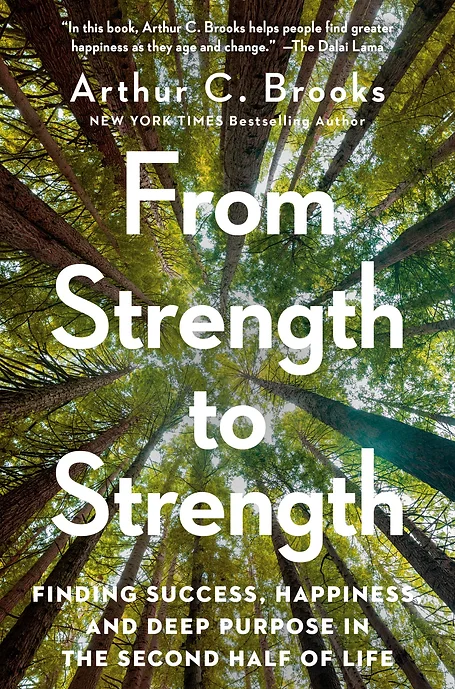You’ve heard of Charles Darwin. You probably heard he wrote a book at age 50, some 160 years ago, titled The Origin of Species that had a profound impact on the world of science and the theory of evolution that remains relevant today.
You would think that kind of groundbreaking contribution to the world would have made Darwin fulfilled with his professional accomplishments.
But it wasn’t. After publishing that book, he became increasingly frustrated he couldn’t achieve as he aged at the levels he could when younger.
“Darwin was successful by the world’s standards, washed up by his own,” writes Harvard management professor Arthur C. Brooks in his new book titled From Strength to Strength. “Only progress and new successes such as he enjoyed in his past work could cheer him up – and this was now beyond his abilities. So he was consigned to unhappiness in his decline. Darwin’s melancholy did not abate, by all accounts, before he died in 1882 at age 73.”
This sad story about Darwin is one of the most illustrative anecdotes in this book about people the author calls “strivers” who work their whole careers to make a mark in their careers, gain prestige, promotions, and power, and acquire material possessions. Think of them as classic workaholics or, at least, hard-driving professionals who derive their self-worth almost entirely from their professional status and achievements.
These people may be like many of you in the Baby Boomer Brotherhood who at least at some periods of your life chased professional accolades above pretty much everything else.
The author zeroes in on the stage of life many of us are in now when we need to make a transition in our lives from hard-working and often high-achieving middle-aged professionals to another phase when we have to contribute in other ways because our intellectual capabilities tend to decline, the likelihood of us creating innovative products and services becomes harder, and we have less energy and more health maladies.
The author, a social scientist who wrote this book at 57, reveals he’s in this unsettling phase of life himself. To figure out how to make this transition fulfilling, he researched widely successful professionals and others facing this transition phase of their lives. What he learned was troubling.
“What I found was a hidden source of anguish that wasn’t just widespread but nearly universal among people who have done well in their careers. I came to call this the “striver’s curse”: people who strive to be excellent at what they do often wind up finding their inevitable decline terrifying, their successes increasingly unsatisfying and their relationships lacking.”
As you enter this transition, the author notes, you can’t rely on your professional accomplishments to help you find fulfillment and happiness.
Counterintuitively, you need to embrace your weaknesses and admit what you can’t do as well anymore. For instance, you can join a company with a bunch of younger people and take on a new role as a sharer of your wisdom learned through decades of experience. As a teacher, you should be open about what you did wrong and how you failed so you can help others who are younger gain more insights and understanding of how to be more effective, successful, and focused on others rather than yourself.
“If you want to make a deep human connection with someone, your strengths, and worldly successes won’t cut it. You need your weaknesses for that. Elite credentials don’t make you relatable. They are a barrier to human connection.”
Talk About Your Weaknesses
“No one goes around bragging that they don’t have good ideas anymore, or that they lack the energy they once had,” the author notes.
“Decline is loss; loss is bad. Remediate it or hide it, but certainly don’t talk about it, right? Wrong. The secret to going from strength to strength is to recognize that your weakness – your loss, your decline – can be a gift to you and others.”
Let me illustrate this in a more personal way. I now work as a writer for a financial services company with a bunch of younger people. This book says I should be shifting towards more of a teaching role in this job, showing younger people how to research stories, identify news, structure news, and feature articles. I will start focusing on sharing wisdom and experience. I need to develop new ways to contribute to a business that will be fulfilling to me and more beneficial to my business and strengthen relationships with younger workers. The result will be more fulfilling for them and me.
In this new phase, you should shift from your previous strengths to share new strengths. That’s the most uplifting and powerful message in the book, that you can make this shift and not spend your later years lamenting you’re no longer at the center of the professional universe, regretting your skills are declining and your brain is less capable.
Not a Crisis, an Adventure
“Your biggest life transition doesn’t have to be a crisis or a period of loss, but rather can be an exciting adventure full of opportunities you never knew existed.”
Final Reflections
I read this book because a few people told me it’s a good one for those in our age group. I have mixed feelings about the central message. While I understand I’m getting older and my brainpower is not what it was 10 or 20 years ago, I actually feel my greatest contributions to the world are forthcoming over the next five to ten years. This may sound delusional but that’s how I see it. You may think overwise about me and yourself. There is subjectivity in this.
The book implies that if you’re a writer you do your best work earlier than my age of 60. I actually believe I’m doing my best writing now. Maybe I’m in denial and totally off base. But I’ve heard plenty of stories about writers doing their best work into their sixties and seventies. This gives me hope I can still get better. I guess it depends on the person and the profession.
What I do think is important from this book is the message that you can’t keep doing anything but work, basically, forever. You will become less productive, inevitably, and you need to figure out how to make valuable contributions in new ways to feel fulfilled.
Especially important is to develop more meaningful and sustainable interpersonal relationships. Loneliness is a real problem for people as our age and higher. It’s a pathetic and agonizing situation to endure. I feel lonely sometimes and don’t really want it to continue.
To avoid loneliness, we need to reach out to each other more, give more than we take, call someone up for a cup of coffee and ask how the other person is doing, focusing on them – not you.
One of my greatest weaknesses is focusing on myself way too much. I want to change that but only my actions will show whether I do.
As for all of you, I say onward, Baby Boomer Brotherhood. Move from strength to strength. Along this journey embrace your weaknesses.
And be fulfilled until your last breath.
Author Profile

-
Sammy Sportface, a sports blogger, galvanizes, inspires, and amuses The Baby Boomer Brotherhood. And you can learn about his vision and join this group's Facebook page here:
Sammy Sportface Has a Vision -- Check It Out
Sammy Sportface -- The Baby Boomer Brotherhood Blog -- Facebook Page
Latest entries
 BonusApril 22, 2024Old Friends Reconnect As New Friends
BonusApril 22, 2024Old Friends Reconnect As New Friends BonusApril 21, 2024Sportface Unveils Board of Directors to Land Sneaker Deal
BonusApril 21, 2024Sportface Unveils Board of Directors to Land Sneaker Deal BonusApril 20, 2024A Horrible Life Becomes Great
BonusApril 20, 2024A Horrible Life Becomes Great BonusApril 15, 2024Dancing in the Meadowlands – Then Darting Away
BonusApril 15, 2024Dancing in the Meadowlands – Then Darting Away

